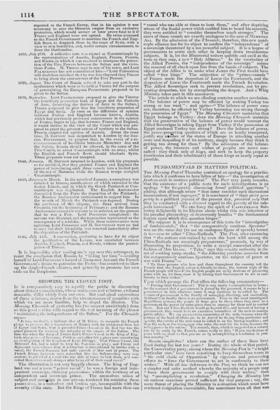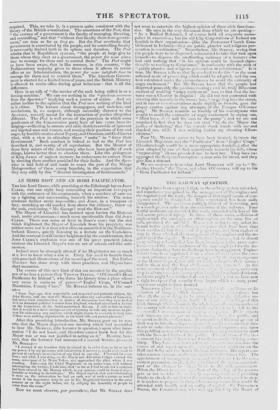FUNDAMENTALS IN 3.1ATTERS POLITICAL.
Tun ..1forning Post of Thursday contained an apology for a practice into which it confesses to have fallen of late—" the investigation of fundamentals in matters political." The Pact very justly remarks, that the existence of a public taste for such investigations is an apology " for frequently discussing broad political questions " adding, that although aware " that some consider such discussions • inconvenient, if not improper," it is convinced of " their strict pro- priety in a political journal of the present day, provided only that they he conducted with a discreet regard to the gravity of the sub- jects introduced." We can fancy the spirit of CASTLEREAGH flut- tering delightedly in its Elysian abode whilst this sole inheritor of his peculiar phraseology so dexterously handles " the fundamental feature upon which this question hinges."
We suppose it is in consequence of this taste for "investigation of fundamentals," that " the comparatively cautious Spectator" was on the same day (to use an analogous figure of speech) horsed itt terrorem to other " Ultra-Radicals." The Post, after enouncing that " the notions entertained by even the least wild among the Ultra-Radicals are amusingly preposterous," proceeds, by way of illustrating its proposition, to write a receipt somewhat after the fashion of' Mrs. GLASS. "Take," says this erudite authority in the art of cooking rump-steaks, " the following precious morceau front the comparatively cautious Spectator, on the subject of peace or war with France"- " To those persons who here and there throughout the country tell the French that the English nation is friendly to them, the instant reply of the French people will be-1f the English people are really desirous of preserving peace Avid, us, let them show it by forcing their Government to act is con- formity to their wishes."
Upon which passage the Post offers the following commentary- " Forcing their Government This is very nearly a contradiction in terms; for the moment that a government is forced by the governed, it ceases to be a government in fact, whatever name it. may continue to be called by. The essence of government is the faculty of managing, directing, and controlling. Without that faculty there is no government. Even in the most unmitigated Republican systems, the people at large give to those whom they elect as a government the power thr sonic given time to inallOge for them and to control them. But our Ultra-Radicals would go beyond this, and instead of having a government, they would have an executive committee of the nob to nonage public affairs. We say an executive committee of the mob, because when the persons at the head of affairs arc to be •l need to do any thing particular and specific, the service of the mob must be called in as the /lacing-machine; and thus the mob, or the deinagogue who rules the mob fur the hour, becomes the ruling power in the nation. The remark, then, which is suggested as a natural one to be made by the French, conies really to this, ' If you are desirous of peace with us, show its that you arc so by accomplishing, a revolution in your own country.'" • S'ancla simplicitas ! where can the author of these lines have lived during the last ten years? During the whole of that period, the Conservative party, among whom the illorning Post is "a bright particular star," have been contriving to keep themselves warm m " the cold shade of Opposition " by vigorous and persevering efforts to " three the Government to act in Conthrmity to their wishes." With all due deference to the Post, we think we can see a simpler and safer method whereby the majority of a people may " three their government to comply with their wishes," than by " accomplishing a revolution." Changing the Ministry has on various occasions proved sufficient fbr that purpose ; nay, the mere threat of placing the Ministry in a situation which must have rendered resignation unavoidable, has sometimes been all that was required. This, we take it, is a process quite consistent with the theory of the British constitution. The assertions of the Post, that " the essence of a government is the faculty of managing, directing, and controlling," and that " without that faculty there is no govern- ment," are true as far as they go. But the Post overlooks that government is constituted by the people, and its controlling faculty is necessarily limited both in its sphere and duration. The Post admits that in Republican systems, "the people at large give to those whom they elect as a government, the power for some given time to manage for them and to control them." The Post ought to have been aware, that in like manner, in this country, " the Parliamentary majority gives to those whom it allows to retails office as an Administration, the power for some indefinite time to manage for them and to control them." The American Govern- ment is elected for a limited term of years, and the British Ministry is allowed to retain office during good behaviour : that is all the difference.
Here is no talk of "the service of the mob being called in as a forcing-machine." We can see nothing in the "precious morceam from the Spectator" implying such a course of action. And we rather incline to the opinion that the Post sees nothing of the kind in it either. The lecture about demagogues, and mob-law, and revolutions, is, we suspect, although ostensibly directed to the Spectator, covertly meant for the instruction of parties altogether different. The Post is well aware of the practices in which some gentlemen of the Conservative party have of late years been in- dulging—collecting in remote and rude districtscrowds of ignorant and bigoted men and women, and rousing their passions of fear and anger, by horrible stories about Popery, and 0 wenism, and God knows what, with a view to stimulate those " mobs" to " force their Government." Such conduct is indeed as bad as the Post has described it, and worthy of all reprobation. But the Mentor of those fiery scions of the Aristocracy who have been guilty of such things, knows better than to chastise them. Like the pedagogue of King JAMIE Of sapient memory, he endeavours to correct them by showing them another punished for their fitults. And the Spec- tator is laid hold of and made to enact the part of the Mungo Malagrowther of these young hopefuls, in the expectation that they may edify by this " discreet investigation of fundamentals."



























 Previous page
Previous page